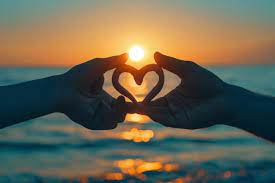Love—a simple word, yet one of the most profound and complex experiences in the human journey. From poets and philosophers to scientists and psychologists, everyone has attempted to define and decode it. Is love a feeling? A choice? A chemical reaction? Or something divine?
Let’s take a journey through the heart, exploring the many faces, meanings, and mysteries of love.
1. The Many Faces of Love
Love is not a single emotion—it’s a spectrum. We experience love in different ways, toward different people, and in different phases of life. Some of the major types include:
Romantic Love
This is the kind of love most often portrayed in movies and songs. It involves passion, attraction, and often an emotional bond between two people. Romantic love is intense, sometimes irrational, and often the beginning of a deep emotional connection.
Familial Love
This is the love we feel for family—parents, siblings, and children. It’s a deep, often unconditional bond based on blood, shared history, and responsibility. It shapes us from childhood and provides a foundation for our emotional development.
Friendship or Platonic Love
Friends are the family we choose. Platonic love is based on mutual respect, trust, and shared values. It’s not driven by attraction or obligation, but rather by a connection of minds and hearts.
Self-Love
Often overlooked, self-love is perhaps the most essential. It involves accepting and caring for oneself, recognising your worth, and treating oneself with kindness. Without self-love, loving others deeply becomes difficult.
Unconditional Love
This is the purest form of love—offered without expectation, condition, or demand. It is seen in a mother’s love for her child or in spiritual contexts where divine love is described.
2. Love Through the Ages
Love has been a subject of fascination and debate across centuries:
-
In Ancient Greece, philosophers categorised love into several types: Eros (romantic love), Philia (deep friendship), Storge (familial love), and Agape (unconditional love).
-
In the Middle Ages, love was often idealised in poetry and courtship. Chivalry and devotion were considered central to romantic ideals.
-
In Modern Times, love is often seen as a blend of emotional intimacy, physical attraction, and partnership.
No matter the era, love has remained central to human identity and purpose.
3. What Science Says About Love
Modern science approaches love from a different angle. Neuroscientists and psychologists have studied how love affects the brain and body.
The Chemistry of Love
When we fall in love, our brains release chemicals like dopamine, oxytocin, and serotonin. These chemicals create feelings of pleasure, trust, and emotional bonding. That “butterflies in the stomach” feeling? It’s a real biological response.
The Psychology of Attachment
Psychologist John Bowlby developed the attachment theory, showing how early relationships with caregivers influence how we form emotional bonds in adult life. Love is, in part, our way of seeking safety, security, and connection.
The Evolutionary Perspective
From a biological point of view, love helps humans form long-term partnerships, protect offspring, and build communities. It’s essential for survival.
4. Love as a Choice
While love often begins with a feeling, maintaining love is more than emotion—it’s action. In long-term relationships, love is nurtured through:
-
Communication
Sharing thoughts, listening, and being honest. -
Respect
Accepting each other’s differences and treating each other with dignity. -
Compromise
Meeting in the middle and solving conflicts without ego. -
Effort
Keeping the spark alive through gestures, time, and shared goals.
Choosing to love someone every day, even when it’s difficult, is a deeper expression than merely falling in love.
5. The Pain of Love
Love is powerful, but it’s not always joyful. Love can hurt—when it’s lost, unreciprocated, or betrayed.
Heartbreak
Almost everyone experiences heartbreak. It’s a painful reminder that love involves vulnerability. But heartbreak can also be a moment of growth and transformation.
Unrequited Love
Loving someone who doesn’t feel the same way is a common and deeply human experience. It teaches us about boundaries, self-respect, and the value of letting go.
Toxic Love
Not all love is healthy. Obsession, control, and emotional dependence can masquerade as love. True love should never harm your sense of self or well-being.
Still, even in pain, love teaches us lessons no other emotion can.
6. Love in Different Cultures
Love takes many forms across the world. While the feeling may be universal, how love is expressed varies widely:
-
In India, arranged marriages have long been a tradition, blending family values, societal expectations, and growing love over time.
-
In Japan, love is often subtle, expressed more in action than words.
-
In Latin cultures, love is passionate and expressive, celebrated through touch, poetry, and celebration.
-
In Western cultures, love is seen as individual choice, personal freedom, and romantic idealism.
Understanding cultural expressions of love deepens our appreciation of others’ richness and diversity.
7. The Role of Love in Personal Growth
Love isn’t just about relationships—it’s about transformation.
-
Love teaches empathy: It opens our hearts to others’ pain and joy.
-
Love builds resilience: Through heartbreak and healing, we grow stronger.
-
Love inspires creativity: Art, music, and poetry often flow from the depths of love.
-
Love connects us to purpose: Many people find meaning in the act of loving, whether through parenting, caregiving, or service.
When we give and receive love, we become more fully human.
8. Love and Spirituality
Many spiritual traditions regard love as divine. In Christianity, love is central: “God is love.” In Buddhism, metta is loving-kindness toward all beings. In Sufism, the mystical branch of Islam, love is the path to union with the divine.
Spiritual love transcends physical attraction and personal desire. It’s about oneness, compassion, and universal connection.
9. Modern Challenges to Love
In today’s fast-paced world, love faces new tests:
-
Technology: While dating apps connect people, they also commodify love and can make relationships feel transactional.
-
Social media: It often portrays perfect love, making real relationships seem inadequate.
-
Busyness: People have less time and emotional space to build deep, lasting connections.
-
Fear of vulnerability: Many fear getting hurt and avoid love altogether.
Yet, even amidst these challenges, love continues to thrive because the human heart longs for connection.
10. Conclusion: Love Is a Journey, Not a Destination
So, what is love?
Love is not just a feeling—it’s an experience, a decision, a transformation. It’s joy and pain, passion and peace, self-discovery and selflessness. It is the invisible thread that connects us all.
To love and be loved is to walk through life with an open heart, knowing that while love may not always be easy, it is always worth it.
In the end, love is not something we find. Love is something we become.


